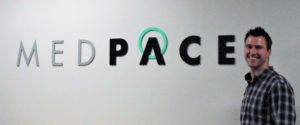Alumni Spotlight: Dr. Nathan Mitchell Works At Medpace

 When did you first become interested in science?
When did you first become interested in science?
I have been interested in science for as long as I can remember. My grandmother was a physician scientist at UT Southwestern and my father is a urologist in North Texas. Biomedical science is a part of my family’s identity.
Why did you pick The University of Texas Health Science Center at San Antonio and your program?
I chose The University of Texas Health Science Center at San Antonio because of the exciting work being conducted by Dr. Lynette Daws, a neuroscientist in the Department of Cellular and Integrative Physiology. Her research focuses on exploring novel therapeutic targets for psychiatric disorder, which was always a field I was interested in.
Tell me more about your career path.
I was introduced into the world of clinical research by assisting medical students with statistics and science writing for their summer research projects. The opportunity allowed me to gain exposure into the field of clinical research early in my career. I continued helping with these projects until I was fortunate enough to make a full-time transition to Medpace, a contract research organization where I now work. Medpace offers comprehensive education programs that develop young professionals into clinical research experts!
Tell me about your current career, what do you do?
I am a Clinical Research Associate (CRA), which is a common entry-level position into the field of clinical science. CRAs serve as clinical trial monitors and liaisons to research site staff (i.e. physicians and clinical coordinators). This position requires a notable amount of travel to research sites, as well as effective use of both “soft” and “hard” professional skills. CRAs are experts in Good Clinical Practices, research protocols, and FDA regulatory guidelines that must be followed to bring new medical devices and pharmaceuticals to market.
What is a day like in your job?
If a prospective research hospital is interested in participating in a trial with a novel investigational product (i.e. new drug or medical device), then a CRA will interview site staff to assess their capabilities to conduct the trial. If a site is selected for participation in a clinical trial, then CRAs will conduct monitoring visits to train medical professionals on a given trial’s protocol, verify accurate collection of data, verify patient safety, as well as other trial related tasks.
How did the education you get at The University of Texas Health Science Center at San Antonio prepare you?
It was helpful in a broad sense. I feel as though my professional skills in writing, presenting, and project management were strengthened by my thesis work.
What is the most challenging part of your work?
See below.
What is the most rewarding part of your work?
Developing new tools to treat disease is an incredibly difficult, labor intensive, and expensive task; however, the effort truly pays off when a medical innovation is found to save patients’ lives.
What has been your proudest achievement?
Honestly, graduating with a Ph.D. in Physiology from the Graduate School of Biomedical Sciences at UT Health San Antonio. It was a challenging five year process that I am very proud to have achieved.
What would you tell a current student interested in your career? Any advice?
Gain experience: You will be more competitive for clinical science positions by gaining as much experience with medical professionals as possible. My clinical research experience was gained by volunteering to help physician researchers with abstract writing and statistics. This experience likely was very helpful at landing interviews during my job search.
Know the requirements: A post doc can be helpful, but is often not necessary in many industry positions. I have seen many job listings that specifically stated “post doctorate experience excluded.” Entry-level positions in industry essentially sever a similar function as a post doc in academia, so I would apply for those positions right out of graduate school.
Be open minded: Experience in a new industry is always useful. Do not feel as though you will be stuck in a career path forever when you make a career decision. As an example, I met a medical science liaison (MSL) manager who graduated with his Ph.D. then went into construction for six years building houses. He then got into the pharmaceutical industry by working as a medical information specialist before transitioning to a MSL position. It is okay to have fun with your career path.
What do you like to do outside of work?
Garden!
Medpace is currently hiring and is seeking resumes from MS/PhD level graduates. People can contact Nathan with any questions at N.mitchell@medpace.com
